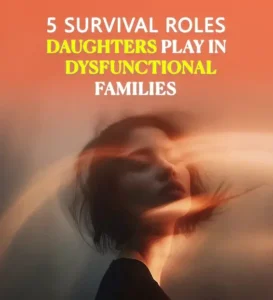
Not every daughter is raised in a home where her emotional needs are seen, validated, and nurtured. In families where dysfunction, neglect, trauma, or emotional immaturity is present, daughters often unconsciously adapt by taking on survival roles.
These roles aren’t who they truly are – they’re masks crafted by necessity, shaped to keep peace, avoid conflict, and maintain connection in unstable environments.
Let’s explore the five most common survival roles daughters adopt to cope: The Pleaser, The Parent, The Overachiever, The Therapist, and The Ghost.
1. The Pleaser – “If I’m good, I’ll be loved.”
The Pleaser daughter is the one who:
- Avoids conflict at all costs
- Constantly says “yes,” even when she wants to say “no”
- Puts others’ comfort and happiness above her own
- Fears rejection or abandonment when she asserts herself
She learned early that being agreeable and helpful earned her approval – or at least minimized emotional chaos. But beneath the politeness is a deep fear: If I stop pleasing, will I still be loved?
Long-term effects:
- Chronic people-pleasing and lack of boundaries
- Difficulty expressing anger or unmet needs
- Over-apologizing and internalized guilt
- Relationships built on over-functioning
Healing Path:
- Practice saying “no” without justification
- Reconnect with your preferences and desires
- Remember: love that requires you to shrink isn’t real love
2. The Parent – “If I take care of everyone, I’ll feel safe.”
The Parent daughter became the adult too soon.
She:
- Took care of siblings, emotionally or physically
- Protected her parent(s) from their own emotions
- Felt responsible for everyone’s well-being
- Rarely got to be a child
In emotionally immature households, she was the one who held things together.
This role brings strength-but it also brings exhaustion. She grows up believing her worth is tied to how well she carries others.
Long-term effects:
- Deep-rooted burnout and resentment
- Difficulty receiving or letting go of control
- Attracting codependent relationships
- Feeling lost without someone to “fix” or “help”
Healing Path:
- Tend to your own inner child
- Practice letting others carry their own weight
- Learn to be nurtured, not just nurturing
3. The Overachiever – “If I excel, I’ll finally be enough.”
This daughter turns pain into performance. She chases perfection in school, work, relationships – hoping achievement will earn love, validation, or protection.
She learned that being excellent was a shield – a way to stay visible in homes where emotional connection was inconsistent or absent.
Long-term effects:
- Burnout masked as ambition
- Fear of failure and chronic self-criticism
- Difficulty resting or doing “nothing”
- Identity tied solely to performance
Healing Path:
- Redefine success as being, not just doing
- Celebrate softness and imperfection
- Remember: you are worthy even when you’re still
4. The Therapist – “If I understand and heal them, I’ll feel safe.”
The Therapist daughter becomes the emotional caretaker.
She:
- Listens to everyone’s problems
- Mediates conflicts between parents or family members
- Becomes the “fixer” of dysfunction
- Takes on the moods of those around her
She was emotionally parentified, praised for her wisdom, maturity, or insight—but underneath was a child who was never truly heard herself.
Long-term effects:
- Emotional exhaustion
- Struggle to set energetic and emotional boundaries
- Attracting wounded or unavailable partners
- Feeling invisible unless being “useful”
Healing Path:
- Stop rescuing people who don’t want to change
- Separate compassion from responsibility
- Invest in spaces where you are the one held
5. The Ghost – “If I disappear, I won’t get hurt.”
The Ghost daughter learned it was safer to become invisible.
She:
- Withdraws to avoid conflict or emotional overwhelm
- Keeps her opinions and emotions hidden
- Believes that having needs is dangerous or burdensome
- Is often overlooked, quiet, or labeled “the easy one”
She may have grown up in a chaotic or unpredictable home where being unnoticed felt like the only protection.
Long-term effects:
- Struggling to take up space
- Avoiding intimacy or vulnerability
- Disconnection from emotions or desires
- Feeling lonely even in relationships
Healing Path:
- Give yourself permission to be seen and heard
- Reconnect with your voice and creativity
- Remember: you’re not too much – you’ve just been unseen too long
The Truth Beneath It All
Every one of these roles is a response to unmet needs – an adaptive strategy, not a flaw.
What looks like perfectionism, selflessness, or independence on the outside may be masking pain, fear, and a longing to be loved for who you truly are. You didn’t choose these roles. But now, you can choose to put them down.
Moving from Surviving to Thriving
Here’s how you can begin to break free from survival roles:
- Name your role – Awareness is the first step.
- Grieve your story – It’s okay to mourn the childhood you didn’t have.
- Reclaim your wholeness – You are more than the role you were forced to play.
- Seek safe spaces – Whether through therapy, community, or journaling, find places to be real.
- Reparent your inner self – Give your younger self the love, rest, and freedom she never got.
A Final Note: To the Daughter Who Had to Be Too Much, Too Soon
You are not broken.
You were brilliant enough to survive.
But survival isn’t your whole story.
You are allowed to rest.
To receive.
To make mistakes.
To be loud.
To take up space.
You are allowed to just be.
Because the real you – not the role, not the mask – is more than enough.






















